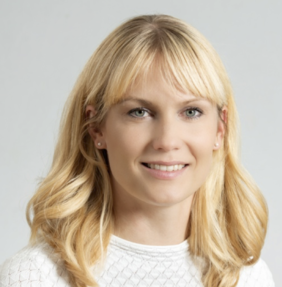Each year the Klaus-Georg and Sigrid Hengstberger Award enables up to three young scientists at Heidelberg University to organize their own dedicated symposium. This year, Dr. Dominika Wylezalek, Emmy Noether Junior Research Group Leader at the Astronomisches Rechen-Institut (ARI) of the Center for Astronomy of Heidelberg University (ZAH), is one of the awardees. The award has a value of 12.500 Euro and will support Dr. Wylezalek in organising a scientific symposium at the Heidelberg International Science Forum (IWH) on "Quo Vadis Galaxy Evolution: How galaxies form and evolve" from June 30 – July 4, 2025. Dr. Wylezalek formally received the Award from Prof. Dr. Frauke Melchior, Rector of Heidelberg University, during the university's annual celebration on October 19, 2024.
In her research, Dr. Wylezalek deals with the physical processes that influence the formation and evolution of galaxies. Using spectroscopic measurements, she studies how active galactic nuclei impact on the development of their host galaxies and their galactic environment. The Heidelberg astrophysicist has already been able to show that the energy pumped into the environment from these black holes has a relevant influence on the formation of stars and hence on the present form of galaxies. In a research project run by NASA and ESA the Heidelberg scientist collected data from the James Webb Space Telescope and discovered a galaxy cluster with a large number of massive galaxies emerging around an extremely red quasar. It stems from the cosmological epoch of very active star formation about ten billion years ago. Dr. Wylezalek’s observations help us to understand how galaxies in the early universe melted into the cosmic web we see today.
In her Hengstberger Symposium, planned for 2025, Dr. Wylezalek will bring together world-leading experts from several fields in astrophysics, with expertise in simulations, observations and theory, to discuss, reflect, and to chart the future course of extragalactic astronomy.
Dominika Wylezalek studied physics at the universities of Heidelberg and Cambridge (UK). In 2014 she earned her doctorate at the Ludwig Maximilian University of Munich. She went on to do postdoctoral research at Johns Hopkins University in Baltimore (USA) and at the European Southern Observatory in Garching near Munich as a research fellow. Since 2020, Dr Wylezalek has led the Emmy Noether junior research group “Galaxy Evolution and AGN” (GALENA) at Heidelberg University. For her contributions to observational astrophysics, the scientist has already been honoured with the MERAC Prize of the European Astronomical Society and the Ludwig Biermann Award of the German Astronomical Society and the Heinz Maier-Leibnitz Prize for Astrophysicist.
BACKGROUND INFORMATION
Since 2004, up to three Klaus-Georg and Sigrid Hengstberger awards are annually granted to young scientists and researchers of the Ruprecht-Karls-Universität Heidelberg. The awards are intended to enable the awardees organize a scientific symposium “The Ruperto Carola Symposium at the IWH: A Sponsorship Award for Young Scientists.” A sum of 12.500 Euros is awarded to each of the three selected projects. The award is aimed at scientists, researchers or scholars working in any academic discipline, be it natural sciences and medicine or humanities and social sciences. The award ceremony for the Klaus-Georg and Sigrid Hengstberger Award takes place during the anniversary celebrations ("Jahresfeier") of the Ruprecht-Karls-University.
The International Academic Forum Heidelberg (IWR) is an interdisciplinary centre for scholarly exchange in academia. As a vital organ and think tank of the Heidelberg University it has been providing a platform for multidisciplinary intellectual engagement for over three decades. Since its inauguration on April 12th 1986, more than 2000 symposiums, workshops, seminars and conferences have convened at the International Academic Forum. The IWH is a research facility of Heidelberg University. For more information see HERE.

